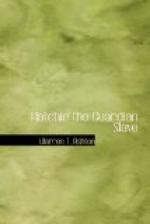Hatchie, understanding at once the nature of the calamity, made his way, as well as he was able, through the shattered ruins to the stern, where he discovered that the boat was gone. The flames from the forward part of the boat now enabled him to discover the abductors of Emily rowing down the river. Leaping into the water, he seized a door, which was floating near him, and thus enabled to sustain himself with tolerable ease, he swam after them.
Emily, on recovering from the shock, found herself reclining on the shoulder of a man in an open boat. The first impulse of her pious heart was to return thanks to the Almighty preserver that she had been rescued from a terrible death. Her thoughts then turned to her deliverer, for such she supposed was the person in the boat with her. Who was he? Was it Henry Carroll? She hoped it was. She raised her head from the position in which Maxwell had placed it, and endeavored to distinguish his features; but the darkness defeated her wish.
“Fear nothing, lady; you are safe,” said Maxwell.
The voice was like the knell of doom. It grated harshly upon her ears, and gave rise to a thousand fears in her timid heart.
“Thank God, I am safe!” said she, after a pause.
“And I thank God I have been the means of preserving you,” replied Maxwell, willing to render the terrible calamity an accessory to his crime.
“But why do you go this way?” asked Emily, as she saw the Flatfoot approach the wreck.
“I only wish to convey you from the scene of danger.”
“Then why not go to that steamer?”
“Probably she is by this time converted into a hospital for the sufferers. I would not shock your delicate nerves with such a scene of woe and misery as will be on board of her.”
“May we not render some assistance?”
“No doubt there are more assistants than can labor to advantage now.”
Emily was silent, but not satisfied. Her fears in some measure subsided, when, about two miles below the scene of the disaster, Maxwell ordered the boat to be put in at a wood-yard. The attorney was all gentleness, and assisted her to the cabin of Jerry Swinger, the owner of the wood-yard.
Hatchie had been able, by severe exertion, to keep within hearing of the splashing oars. The current fortunately carried him near the wood-yard, and, aided by the sounds he heard at the cabin, and by the boat which he saw, he concluded the party had landed there. Letting go the door, a few vigorous strokes brought him to the shore. Approaching the cabin, he satisfied himself that his mistress had taken shelter there. Concealing himself in the woods, he awaited with much anxiety the next movement of the attorney. In the morning he heard the noise at the cabin, and had been the means of saving his mistress from a calamity far more dreadful than death itself.




